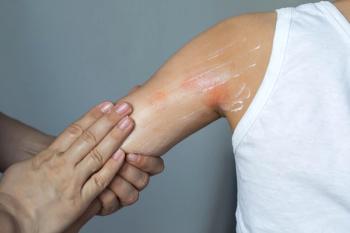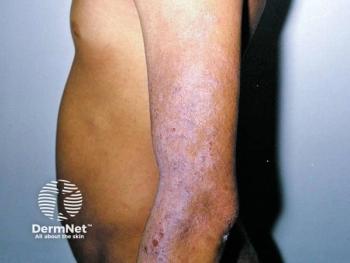
Study says new inhibitor more effective than cyclosporine intreating plaque psoriasis
Montreal -- Researchers here say that a new oral calcineurininhibitor called ISA247 is an effective treatment for chronicplaque psoriasis and has fewer risks than the commonly usedcyclosporine.
Montreal - Researchers here say that a new oral calcineurin inhibitor called ISA247 is an effective treatment for chronic plaque psoriasis and has fewer risks than the commonly used cyclosporine.
Writing in the March issue of the Journal of the American Academy of Dermatology, Robert Bissonnette, M.D., of Innovaderm Research in Montreal, and colleagues note that the use of cyclosporine, another calcineurin inhibitor, can cause nephrotoxicity, thereby limiting long-term use.
Dr. Bissionette and colleagues write that ISA247 binds to calcineurin in a way similar to that of cyclosporine - but that their studies, performed on animals, show it to be more potent and less likely to cause renal toxicity than cyclosporine.
The researchers conducted a double-blind study in 201 plaque psoriasis patients with at least 10 percent bodysurface area involvement. The patients were randomized to either 0.5 mg/kg per day of ISA247 or 1.5 mg/kg per day, or to a placebo.
At the end of the 12-week trial, 15 percent of those in the lower ISA247 dose group and 45.1 percent of those in the higher dose achieved at least a 2-point reduction in Static Global Assessment; none of the placebo patients achieved this score. Meanwhile, 18.2 percent of patients in the lower dose group and 66.7 percent of the higher dose group showed a 75 percent reduction in the Psoriasis Area and Severity Index - while none in the placebo group registered this score. The researchers noted that although serum creatinine increased in patients treated with the higher dose of the new inhibitor, it remained within normal levels.
The researchers wrote that the ISA247 agent “induced a statistically and clinically significant dose-dependent improvement in psoriasis severity, and it was well tolerated.” They conclude by calling for further studies of dosage levels and of any possible effect on glomerular filtration rate.
Newsletter
Like what you’re reading? Subscribe to Dermatology Times for weekly updates on therapies, innovations, and real-world practice tips.












